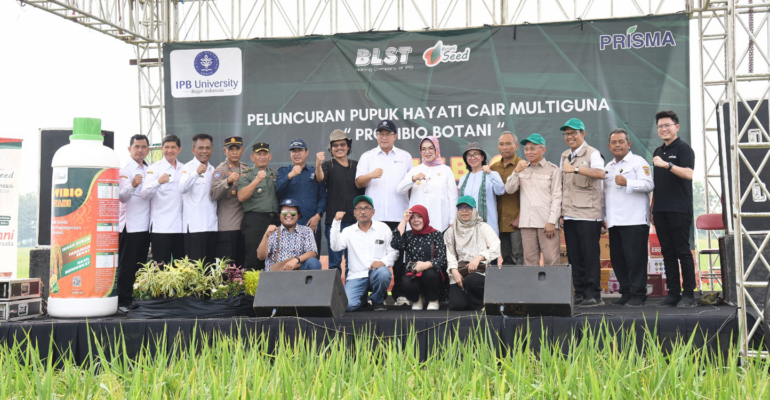IPB University Launches Provibio Botani: Multipurpose Biofertiliser as a Solution for Sustainable Agriculture

Responding to farmers’ needs for environmentally friendly fertilisers to support sustainable agriculture, IPB University launched ‘Provibio Botani’, a multipurpose biofertiliser on Wednesday (15/5) in Kragilan Village, Mojolaban District, Sukoharjo Regency, Central Java.
Provibio Botani multipurpose biofertiliser invented by IPB University innovator Prof Dwi Andreas Santosa contains nine functional microbes that have various benefits, one of which is to improve soil fertility and health. This fertiliser can increase the productivity or yield of crops (in particular, it generally increases production by 1-3 tonnes of GKP/hectare in rice).
In addition, Provibio Botani can reduce the use of chemical fertilisers by 25-30 per cent (depending on the variety and initial soil conditions), accelerate composting (only takes 2 weeks) and make high-quality compost (tailored compost), and make plants more resistant to pests and diseases.
Specifically, the combined use of Provibio Botani multipurpose biofertiliser with New Type Superior Variety Seeds (VUTB) IPB 3 Sakti (IPB3S) or IPB 9 Garuda (IPB9G), will save the use of chemical fertilisers between 30-40 percent (depending on initial soil conditions) and save 10-20 percent water.
Rector of IPB University, Prof Arif Satria talked about the importance of using environmentally friendly fertilisers in relation to Climate Smart Agriculture (CSA). He said that these fertilisers have a strategic role in facing various future agricultural challenges.
“The challenges are higher dependence on chemical fertilisers and pesticides, decreased quality and productivity of agricultural land, disruption of soil ecology, and climate change,” he said.
Furthermore, Prof Arif said any increase in temperature would reduce rice productivity. This fertiliser innovation is a solution to climate change because it can increase rice productivity by 0.5-1.5 tonnes per hectare, a significant increase.
“In 2024, fertiliser subsidies will reach 9.7 million tonnes. With the Provibio Botani fertiliser innovation, we can save 25 per cent of the fertiliser subsidy budget. Universities are tasked with producing innovations and producing innovators who utilise them for positive impacts,” he said.
In this event, the Regent of Sukoharjo, Hj Etik Suryani, SE, MM expressed her support to IPB University and PT Botani Seed Indonesia in the launch of Provibio Botani multipurpose biofertiliser in Sukoharjo Regency.
She said that Sukoharjo is a rice granary in Central Java. The rice surplus in this region is the result of the success of various parties in pursuing new technological innovations in agriculture, so as to meet the production needs in Central Java.
“I would like to say thank you, and I hope this fertiliser can be well received by our farmers and hopefully it can support rice productivity in Sukoharjo Regency. I also hope that the demonstration plots will be expanded in 11 other sub-districts in Sukoharjo,” he said.
Chairman of the Australia Indonesia Partnership for Promoting Rural Income through Support for Markets in Agriculture (AIP-PRISMA), Ivan Iskandar, said that for rice farming, the use of Urea and NPK chemical fertilisers is 80 per cent and 20 per cent higher than the Ministry of Agriculture’s recommended dose, respectively. In contrast, the use of organic fertiliser is 25 per cent lower than the recommended dose.
“Hopefully, the launch of Provibio Botani fertiliser will become a momentum for changes in better agricultural practices and provide benefits to farmers in Indonesia,” he said.
Chairman of PT Botani Seed Indonesia, Dadang Syamsul Munir also specifically thanked PRISMA (Partnership Programme between the Government of Indonesia and the Government of Australia for the growth of agricultural markets in Indonesia), which has supported IPB University in promoting and educating farmers to use multipurpose biofertilisers.
The multipurpose biofertiliser ‘Provibio Botani’ has been introduced to smallholder farmers in more than 20 cities and districts in Central Java and East Java.
Farmer representative Wignyo revealed that Provibio Botani fertiliser is beneficial for rice plants by reducing broken necks and the use of chemical fertilisers by up to 60 per cent.
“The rice produced is fluffier and can last two to three days without spoiling. In addition, this fertiliser also saves costs and reduces farmers’ dependence on chemical fertilisers,” he explained.
In this event, the Rector of IPB University together with the Regent of Sukoharjo officially launched the commercialisation of multipurpose biofertilisers in front of more than 200 rice farmers from the Sukoharjo Regency area. The event was attended by the ranks of the Ministry of Agriculture, Bappenas, Bulog, the Agriculture and Fisheries Office of Sukoharjo Regency, the Association of Farmers Groups from Kragilan Village and the entire Sukoharjo Regency area. (dr/Rz) (IAAS/RUM)



